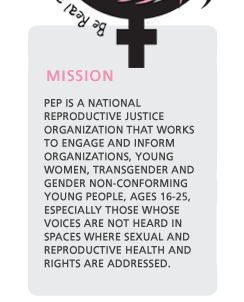From the days of burning bras in the late sixties to the March for Women�s Lives in 2004, women have been voicing their concern about the government trying to tell us what we can and cannot do to our bodies. While nowadays you may get odd stares if you take one of your Victoria�s Secret bras and set it ablaze with a burning match (those bras are expensive, after all!), young women can still fight the war on our bodies within the halls of Congress as well as at our own state capitols. When it comes to sexual and reproductive rights, it�s important for women, especially young women, to care about the laws and policies that are passed or taken away by our state and federal legislators to ensure that our voices (and our bodies) are protected. This is where lobbying comes in.
What is lobbying?
�Lobbying� is the act of speaking with local and federal public policy decision-makers in an effort to gain their support for current legislative laws or new bills that are in favor of what you feel citizens will want. The word �lobby� comes from the idea that advocates would stand in the lobbies of their representatives and senators and
push to have people support their issues. In other words, lobbying is about getting people to do what you want. The more persuasive you are, the better your chances are of having more laws that will reflect positively on the group of individuals you�re representing.
Who do lobbyists target?
Lobbyists target our political legislators, people that we vote into state and local office. For federal leaders, they are elected to represent their home state as legislators in Washington, DC. They become members of Congress, and are either a member of the House of Representatives or the Senate. For state legislators, they are elected to
represent their county or district, and are also a member of their state�s House or Senate.
What is a legislator?
A legislator has many roles�lawmaker, a representative of her/his state or local government, and an overseer of the interests of her/his national and state citizens. As a lawmaker, legislators propose, study, discuss, and vote on legislation to become law as well as modify or completely eliminate current laws. As a representative,
legislators serve her/his constituents (citizens) at the federal or state level. Federal legislators serve as liaisons between their state and Washington, DC, and state legislators serve as liaisons between their county/district and their local government. As overseers, legislators make sure that the laws are being carried out according to their legislative intent.
What Does the Legislative Process involve?
The legislative process is very extensive. However, knowing the steps taken to make laws is beneficial in becoming a great lobbyist. Here�s a brief rundown:
Members of the House or the Senate introduce a bill (a proposed draft of a law prior to becoming a law). (The President or State Governor can also introduce a bill).
The bill is debated amongst the legislators and is given to committees to be revised. Once revised, the bill is brought back before the House or the Senate to be approved. If there is a similar bill that has already been introduced, the bill may then be given to a conference committee to reconcile differences in both bills. The final version of the bill is brought back before the chamber where it was first introduced (either the House or the Senate) to be voted on for approval. It is then sent to the other chamber also to be voted on for approval. If approved by both chambers, the bill is sent to the President or Governor.
The President or Governor can comment on the bill and then sign the bill, or refuse to sign it (veto). If signed, the bill becomes law. If vetoed, it may go back to the House and Senate for redrafting. The House and Senate can override the veto with a two-thirds majority vote in both chambers. If the President or Governor does not return the bill to Congress with her/his objections within 10 days, the bill automatically becomes a law. If the legislative session ends before that 10 day period, the bill is �pocket vetoed� (expired).
How do lobbyists target legislators?
Lobbyists break legislators down into five key categories:
the Winners- These are the legislators that are completely down for your cause. They take your concerns and information about your cause straight to their colleagues, becoming your visible �spokesperson�.
The Buddies- Oftentimes, these legislators are already in agreement with you; they just need a little push. By providing them with more information, statistics, opinions, etc. about your cause, they will be better equipped to become a Champion for you.
The (Fence)ers- These legislators don�t agree with your cause, nor do they disagree. They can vote either way. These are the most important legislators to target when you lobby. By putting together effective persuasion with positive pressure, you will have a better chance at swaying them in your direction.
The �Whatever�s- These legislators, if given the chance, probably won�t vote for your cause. They aren�t really inclined to vote for anything. In this case, you actually wouldn�t want them voting at all. The key is to keep them from becoming more active since they won�t agree. This can become detrimental to your cause.
The Hard Knocks- These legislators definitely don�t care about what you have to say and it will take a great deal of persuasion to get them to see your point. The key in challenging them is to tell other legislators about them, focusing on how extreme their views are on your cause, in order to get more legislators that will actually be for you to be against them.
My Experience as a lobbyist
Before my first experience as a lobbyist, I had no idea what I was getting into. I was given a crash course on lobbying, a folder about what legislative act I would be lobbying for, key points, and a list of legislators from my state that were for, against, and �whatever� to my cause. I lobbied for the Responsible Education about Life Act (also known as the REAL Act), an act that would provide federal money to support responsible sex education in schools, including science-based, medically accurate, and age appropriate public health information about both abstinence and also contraception. This bill is popular among legislators that are for sexual and reproductive issues that include comprehensive sexual education, yet those who are more conservative and are for abstinence-only education in schools are against it. There are legislators (liberate, moderate, and conservative) who have not agreed to support it.
I went to both the House of Representatives and the Senate to lobby. I was able to speak to staffers (employees of the legislators) about the REAL Act as well as staffers whose employers were against it or had no opinion on it. In my case, I came across Winners and Hard Knocks, the two extremes. Armed with my information as well as folders of information about the REAL Act to be given to the staffers, I walked the halls in amazement as well as in a �What in the world am I doing?� daze. The second time I lobbied, a year later, I was more confident about what I had to do (and I knew my way around more). It was a great experience. There is nothing like having someone listen to my voice as well as the voice of the people from my state. I was able to share my knowledge about the REAL Act as well as personal stories about sexual education from my middle and high school years. Initially, I was afraid to come across a legislator that has voted against the REAL Act, but I didn�t let it get to me. What fun would lobbying be if all you�re coming across are legislators that agree with you? It�s easier, of course, but getting legislators to come to your side (eventually) is great.
My tips on lobbying
The future of our sexual and reproductive freedom depends on what we as young women do today. Here are some tips I have learned on how to be an effective lobbyist: Plan ahead- Never meet a staffer or legislator unprepared. Know your stuff but don�t overload yourself with too much information. Stick to 2-3 issues about your cause, why you�re for it, why they should be for it, and what steps can be taken to make sure they influence more legislators. If you�re lobbying with a group of people, plan out who will lead the visit and who will know what information. If they ask you a question that you cannot answer, say �I don�t have the answer, but I can find out and get in touch with you�. You can take their contact information, and when you find an answer to their question, you can email them with the answer.
Don�t stay long- Get your point across in a timely manner, especially if other people want to speak to the staffer/legislator. If the staffer/legislator agrees with you, great. If not, you can always schedule another visit, leaving behind information on your cause for them to read. If a legislator is in agreement with you, remember to thank them. If they are not, don�t be upset. Just know that in time, s/he may come around and
support your cause.
Remember to follow-up- Be sure to send a thank you note or email to the staff/legislator you talked to as well as any answers to questions they might have had.
|






